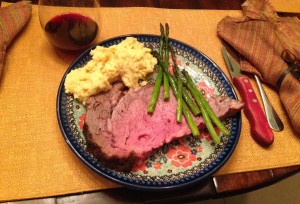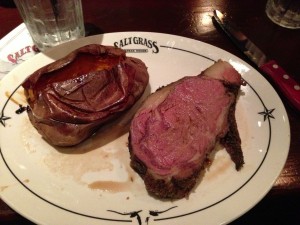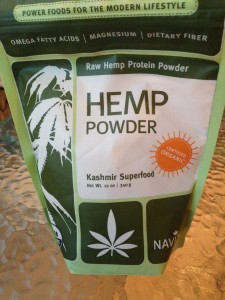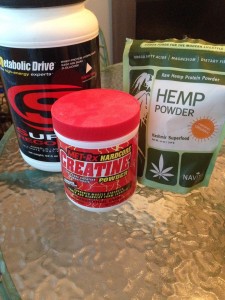 It seems like a silly premise to build an entire article on, a plea to consider adequate protein in the diet. But in a world full of bagels, cereals, muffins, pizza, chips and fries, coupled with crazy busy lives and less and less time to prepare food, it’s easily overlooked. The protein you eat, through the magic of the digestion process, breaks down into individual amino acids. These amino acids are the building blocks of life, many of which are “essential,” which means that our bodies cannot produce them and we MUST get them from our diet. Deficiency in one of these essential areas is no joke and leads to some serious health concerns. In this article I’ll attempt to tackle such heady subjects as proper protein levels for health, physical performance and pregnancy, the importance of animal protein and the problems with a meat-free diet, the truth behind the buzz that red meat is giving us all cancer, the legitimacy of protein powders and overall food quality. Without further ado, here it is, my plea for protein.
It seems like a silly premise to build an entire article on, a plea to consider adequate protein in the diet. But in a world full of bagels, cereals, muffins, pizza, chips and fries, coupled with crazy busy lives and less and less time to prepare food, it’s easily overlooked. The protein you eat, through the magic of the digestion process, breaks down into individual amino acids. These amino acids are the building blocks of life, many of which are “essential,” which means that our bodies cannot produce them and we MUST get them from our diet. Deficiency in one of these essential areas is no joke and leads to some serious health concerns. In this article I’ll attempt to tackle such heady subjects as proper protein levels for health, physical performance and pregnancy, the importance of animal protein and the problems with a meat-free diet, the truth behind the buzz that red meat is giving us all cancer, the legitimacy of protein powders and overall food quality. Without further ado, here it is, my plea for protein.
Why is it so important?
Proteins are the building blocks for organs (from your kidneys to your big ol’ brain), nerves, muscles, flesh, hair, nails, enzymes (the magical little chemicals that kick off all our biochemical reactions) and antibodies. They’re required for transportation of hormones (hormones are fat soluble so they can’t move through the body on their own; when they are formed they are bound to a protein so they can be transported through the bloodstream), neurotransmitters, and the process of blood clotting. The liver uses these amino acids for proper functioning. Basically they are used to grow new cells and repair existing cells throughout the body.
For those of us pumping iron and trying to get ‘70s big, protein is an essential stimulant for building and repairing muscle, joints, tendons, skin and proper recovery after workout. It also aids in the production of hormones that promote fat burning. Protein provides us with access to an incredible array of essential vitamins, such as the B vitamins, iron, zinc, phosphorous, magnesium, copper, cobalt, chromium, nickel, and selenium.
For pregnant women, a wide variety of proteins help set baby up for a healthy weight both at birth as well as later in life, improved insulin sensitivity and lower rates of obesity and diabetes.
Best places to get it:
The best sources of nutrient-rich complete proteins with adequate vitamins and minerals to ensure proper assimilation (discussed more in-depth below) are animal sources, especially red meat.
- Beef
- Liver
- Pork
- Lamb
- Chicken
- Eggs
- Bison
- Turkey
- Game meat
- Salmon (and other cold-water fish)
- Tuna
- Cheese
- Clams/Oysters/Mussels
- Crab/Lobster
So how much do I need/can I handle?
Protein intake is an area that depends a lot on your own genetic makeup, your goals, and your physical activity level. Extensive muscle building (or healing/preventing muscle wasting if you are injured or sick) requires more substrate. If you are craving meat, feeling constantly lethargic, or losing strength/not performing as well in the gym, odds are your body is telling you it needs more building blocks. If you are feeling satisfied after half a ribeye, you’re probably on track for your particular needs. Pay attention to how you feel, and how your input affects your recovery.
There are some conflicting studies, some of which indicate that the body can’t handle more than 30 grams of protein at a time. [1]
However more refined studies have found that protein loading or limiting does not have an affect on overall protein retention. [2]
4-8oz per meal (coupled with a healthy fat source), or a chunk about the size of your palm, should give you adequate satiety and amino acids. If you’re a percentage fan, studies have shown that up to 35-40% of your diet can comfortably be made up of proteins. For muscle mass calculation fans, about 0.8 g/kg/day to maintain muscle, and around 1.9 g/kg/day, are in order to maximize the rate of muscle gain. If you are eating a diet rich in traditional foods that contains an adequate supply of gelatin, you may find your need for meat decreases thanks to gelatin’s protein sparing properties for maintaining muscle mass. Gelatin also has the added benefit of being full of bio-available calcium, magnesium, phosphorous, proline and glycine, crucial to building and maintaining strong healthy bones, cartilage, skin and muscles. I start every day with a cup of gelatin-rich bone broth. In my opinion it’s a way better boost than a cup of coffee!
Isn’t too much protein bad for my kidneys?
Generally no, the body has a way of dealing with a glut of protein. First off, the body creates a compound called CCK [3] as your liver processes the protein (it can only do so at a certain rate), which causes satiety. If you eat too much, CCK will eventually cause you experience severe nausea and pain. It’s really hard for a normal person to eat too much protein, you’ll know about it pretty quickly if you do. In an extreme situation called “Rabbit starvation” (named for the early explorers who succumbed to this issue when forced to survive on nothing but super-lean game meat) can occur from the body’s inability to process an overload of protein byproducts (namely ammonia) where muscle wasting, lethargy and even death can occur. This is a very rare situation however, and thanks to CCK not likely if you are paying attention at all to your diet and how you feel. Also keep in mind this occurs when you don’t have enough FAT cofactors (especially Vitamin A and D) to help process and assimilate the protein, so another good reason to eat your fats J And let’s face it, nature made it easy. It’s a heck of a lot easier to get your protein from some delicious, tender slow-cooked baby back ribs than it is from a dry piece of turkey! If you start feeling lethargic, sluggish and experience headaches, chances are you aren’t getting enough fat in the mix.
There are a few situations where you should be wary. You should always check with your doctor if you think you may have an issue. People with decreased liver or kidney function and pregnant women in particular should manage the amount of protein ingested carefully.
I intend to approach this issue with respect and love for vegetarians. I admire the resolve of people who do not want to live their lives at the cost of suffering and death of other warm-blooded mammals. I certainly do not want my food to EVER suffer, and I want it to live the best life possible right up until it meets its end, both out of respect for the animal itself, and concern for the quality of the meat that will ultimately be assimilated into my cells. I do my very best to know where my food comes from and how it was treated. I talk often with my farmer, and chose him specifically because he feeds and treats his animals humanely.
I believe Sally Fallon of NOURISHING TRADITIONS puts it well when she states:
“It is a mistake to think that meat-eaters lack spirituality-many highly spiritual people eat meat regularly. Perhaps they instinctively realize that when we eat animal products we are accepting, reverently and humbly, the requirements of the earthly bodily temple in which the soul is temporarily housed, even as we look forward to the day when we have completed our earthly assignment and our souls will be free to return to a higher condition, one in which we will no longer be dependent on foods provided by the animal kingdom”
We are creatures of this earth, and our bodies demand certain nutrients that come of it, some of which are best derived from animal products, and some of which are ONLY available from animal products. Those who choose to eat a meat-free diet should absolutely be free to do so, but I believe they should be provided with all the information about the nourishment they are refusing, and fully understand that while the body can survive without it, it will not thrive as it was intended.
What problems arise when we don’t eat meat?
It is difficult to impossible to obtain all the necessary amino acids from a meat-free diet. Arguably, the biggest concern is Vitamin B-12 deficiency. The prime sources are liver, beef, lamb, clams, oysters, mussels, fish eggs, fish, crab and lobster, cheese and eggs, the highest sources being liver and red meat. B12 is an incredibly important nutrient, responsible for a vast array of jobs, such as supporting energy metabolism and immune function, regulating circadian rhythm and improving serotonin secretion, developing and maintaining red blood cells, nerve cells and myelin sheath (nerve covering) cells, as well as the production of DNA, RNA and neurotransmitters. The kicker is, B12 can ONLY be found in animal products. Recent studies have shown that up to 68% of vegetarians and 86% of vegans are severely deficient! [4]
Deficiency in B12 is linked to:
- Premature aging
- Neurological disorders
- cognitive deficiencies
- Anemia
- Impaired eye sight
- Panic attacks
- Nervous system disorders such as weakness, loss of balance, numbness in hands and feet
- Stroke, heart disease and other vascular problems (due to elevated homocysteine-see HERE for more on this issue)
- Developmental disabilities
- Impaired immune function, autoimmune disease and cancer
- infertility
The scary thing is that because B12 is stored in the liver and stores can take a while (sometimes 2-5 years) to fully deplete on a clinical level, deficiency is often not detected until the draw down is severe; however, functional deficiency is causing ongoing damage and much of the nerve damage that can happen is irreversible! [5]
In addition, the iron found in animal protein is far more absorbable than plant iron. Animal protein is also a prime source of absorbable zinc [most plant sources of zinc are bound to phytates and are not as bio-available] which is necessary for the processing of essential fatty acids. These fatty acids are essential for maintaining health and longevity. Red meat is also a principal source of phosphorus, deficiency of which is linked heavily to tooth decay.
Lack of B12 is also a huge issue for pregnant women and nursing mothers who do not include meat in their diet. Studies have shown severe B12 deficiencies in babies of vegetarian mothers, which can lead to low birth weight, insulin resistance and obesity. [6]
Fellas, this affects you too! Zinc deficiency, found commonly in those following a vegetarian diet, has been strongly linked to low sperm count, poor sperm health, and low testosterone. [7]
Another thought to consider- Our guts are structured and optimized for processing high- density proteins. The discovery of cooking to further break meat down coupled with our shortened colons provided our ancestors the ability to extract the substrates and energy required to build bigger brains. We’re not designed to ferment a gigantic amount of starchy carbs into a fat fuel like herbivores (who have much longer intestines replete with additional microbes to break down tons of super-fibrous materials). We are designed to eat fat and protein and turn it into slow burn fuel and leggos for better bodies and bigger brains.
Can’t I just eat tofu, tempeh and nuts?
Many well-meaning people attempt to gain adequate B12 through plant sources such as seaweed, fermented soy, spirulina and brewers yeast. However, plant B12 does not behave or absorb the same in our bodies, and plants also contain B12 variants which block the absorption of B12 and may even increase the need for true B12, causing a deficiency. [8]
Besides the concerns above about B vitamin deficiency, eating a sub-standard form of protein such soy, legume and nut products bring about another round of major problems for our bodies.
Antinutrients, as I discussed HERE, such as gluten, phytates, saponins, gliadin and lectins, found in most whole grains, beans, soy, nuts and legumes prevent the absorption of iron, zinc, calcium, and magnesium, impair iodine metabolism in the thyroid, and cause damage to the gut and immune system. When we eat a low-variety diet (getting protein from products like soy/legumes/nuts/seeds every single day or pretty close to that) we are likely to end up with food intolerance and systemic inflammation from the aggressive proteins constantly attacking the body.
Soy is also a potent source of phytoestrogens, chemicals that act as endocrine disrupters, causing hormonal imbalance and depressed thyroid function, and may be the source of infertility for many struggling families.
These proteins can also cross the placenta [9] , causing numerous hormonal problems for developing baby, most notably structural and functional development of sexual organs for both boys and girls [10] [11]
Soy is also one of the most prevalently grown GMO foods on the planet. This hurts my heart on all kinds of levels, but I’ll save that Pandora’s box for another day.
These foods may keep us alive but we won’t THRIVE as we would if we include all possible sources of complete proteins. For anyone determined to survive on an animal-free diet, it’s important to eat as wide a variety as possible of well-sourced tofu and tempeh, pea, hemp, rice and egg white protein powders (discussed in further detail below), and as much fish, shellfish, eggs and cheese as your beliefs will permit.
 But I read an article that said red meat is giving us cancer, what’s the deal?
But I read an article that said red meat is giving us cancer, what’s the deal?
The latest one hot off the presses can be found HERE. This was a follow up to the observational Nurses’ Health Study and it’s gotten a LOT of press this year. First off, studies like this do not distinguish between pastured/organic meat and feedlot meat fed industrial grown grains, and heavily dosed with anti-biotics and exposed to hormones, pesticides, herbicides and other industrial chemicals. They don’t explore the study participants’ carbohydrate intake (was that “meat” a highly processed burger on a white bread bun served with a side of chips fried in rancid vegetable oil or a grass fed ribeye with a side of organic broccoli with pastured butter?) or look at triglycerides and possible inflammation markers or consider the fact that industrial-raised meats have much higher levels of omega-6 fats (which is why I strongly suggest HERE that you look for pastured sources of meat and fat). They included processed meats such as hot dogs, chemically treated jerky, lasagna, bologna and even PIZZA, and they did not limit preservatives, artificial colors, added sugars and artificial sweeteners. At this point, it really looks to me like they did NO control review at all, and all they can truly be said to be condemning is the standard American diet.
Compare that pretty sad list of what constitutes “meat” with the known benefits of high-quality pastured beef:
- Provides significant levels of B12, as well as thiamin, riboflavin, pantothenic acid, folate, niacin, and vitamin B6, necessary for an incredibly array of jobs in the body such as neurotransmitter health, nerve and muscular communication, metabolism of glucose, detoxification of chemical byproducts and heavy metals, immune function, protection from oxidative damage,
- highly absorbable form of Vitamin D- responsible for healthy bones and teeth
- highly absorbable form of iron-responsible for the creation and maintenance of red blood cells and transport of oxygen throughout the body (and very important when pregnant, as iron is crucial for the growth and development of the fetal brain.)
- zinc, necessary for immune system function, wound healing and DNA synthesis, as well as proper development during pregnancy, and maintenance of taste and smell.
- significant levels of other vital minerals such as magnesium, copper, cobalt, phosphorus, chromium, nickel, and selenium.
Also, the Nurse’s Health Study was an OBSERVATIONAL study which means there were no controls and no way to tell causation from correlation of confounding factors, AND the information was provided via QUESTIONAIRE which was provided once every FOUR YEARS. Can you imagine the kind of inaccuracies that could come from giving answers once every 4 years, good lord! Sometimes I can’t remember what happened last week, especially if I’ve had a few too many glasses of red wine over the weekend! Not to mention, do you think it’s possible that these people filling out the forms could have been less than honest about what they were eating or how they were behaving?
If you want to dig further into this, Mark Sisson has done an amazing breakdown of the latest study and its numerous flaws. Check it out HERE. Definitely good for a chuckle!
It doesn’t help that in an age where cancer and heart disease are running rampant and taking so many loved ones from us far too early, any time there is a “cancer scare” it’s so easy to make people uneasy. We all want to be healthy and avoid that tragic fate, but we should not make changes so lightly without questioning the accuracy of the statement, and not at the expense of some of our most nourishing foods. I fully believe that we should not be beholden to dogma and should absolutely take into account what the latest science is telling us about the world we live in and the effects of the food we eat, but we must also question the parameters used with which to come to the conclusion, especially when it involves such a major source of long-standing nourishment in human history. Everyone must make this determination for themselves, but it’s only fair that the choice is made in light of ALL available information, and not just the bold heading on a poorly designed study or two.
If you do opt, for personal, health or religious reasons, to limit or avoid red meat, I urge you at least to continue to include a rich variety of other animal proteins in your diet to ensure you have all the building blocks for a healthy nourished body and brain. Arm yourself with knowledge and make your best choices for you and your family. Personally I’ll take my chances with Bessie the cow and savor every bite of her grass-fed goodness and nourishment!
I’m pregnant and protein makes me sick, you can’t make me!
I’ve been there girlfriend, and I understand. Part of that aversion IS healthy in this situation. This issue stems from one of the by-products of protein metabolism, nitrogen, which the liver converts to urea, and then the kidneys process and excrete. During pregnancy, the body’s ability to metabolize protein is reduced, and so an excess of nitrogen (as ammonia) and amino acids and build up in the bloodstream, which can increase the risk for low birth weight and overall fetal mortality. Desire for protein ingestion generally goes down during pregnancy as a natural result, but that doesn’t mean we have the green light to spend the next 9 months eating fruit and honey and ice cream for 2. We still need to get some protein in every day. Not only is your body trying to maintain and repair itself, create hormones and fire off a TON of biochemical reactions every day, we’ve got a little transformer growing inside of us and that baby needs protein building blocks to grow! A growing baby needs protein to build that tiny body, brain, and blood supply.
Studies have shown roughly 25% (or about 110g) of daily calorie intake as the safe upper limit for dietary protein during pregnancy. [12] [13]
Also, keep that protein coming in, because once that little angel is born, we need adequate protein for the formation of milk during lactation.
These are a tricky issue. They can definitely have their place in a muscle building plan and as a supplement to whole foods, but they should be used with full understanding of what’s in them and what they do. First off, many people have issues with whey or casein (namely a cross reactivity with gluten [i.e. the body responds to certain substances as if it was gluten] and we know from HERE that gluten wreaks havoc on the body. Dairy-based protein powders are insulinigenic (which is why it makes it beneficial AFTER a workout, when it can drive the nutrients into the muscles) but that’s bad news if you’re starting your day out with a shake in the car on your morning commute or if you have a metabolic issue with insulin sensitivity. You are paying for that convenient breakfast shake with a roller coaster of glucose and insulin and whonky hormones the rest of your day, and you are severely slowing down your ability to burn fat. Many people also find a link between protein powders and autoimmune conditions, finding that dairy increases systemic inflammation.
If you do opt to make these a part of your diet, be sure to get a good brand. Odds are any old random powder probably came from industrial-raised feedlot cows, which means it was subjected to hormones, antibiotics, pesticides, herbicides, industrial feed, and chemical runoff. Also, many powders have been tested and found to be contaminated with some super nasties, such as arsenic, lead, mercury and cadmium. [14] These powders are also processed at extremely high heats, which denatures the protein and may even increase the carcinogenic load. I’ll leave my full analysis of the pros and cons of dairy for another day, but when it comes to adults and dairy its cellular-growth-stimulation properties may already cause a problem for some people, so an increase in carcinogens is something in my opinion is best avoided! Some powders also have MSG added as a preservative, which is a neurotoxin. Do you feel dizzy and confused because you just got a Fran PR, or sprinted till your legs were about to fall off, or is that a toxic load in your brain slowing you down?
There are of course non-dairy based protein powders, such as egg white, pea, hemp, and rice. The problem we run into with these powders is that they have a lower amino acid profile and are a less bio-available source of protein (the body doesn’t absorb and uptake it as efficiently) and if we can’t utilize it, why the heck are we spending our hard-earned money on it?
Some brands have made the goal to provide a better products, such as Stronger Faster Healthier and Designs For Health. Use these products sparingly and pay attention to how you look, feel, and perform while you’re using them.
Takeaway Tips:
- Eat roughly 4-8 oz of protein at each meal (until sated), paired with healthy nourishing fats.
- Eat a wide variety of animal proteins including beef, pork, lamb, chicken, eggs, fish, shellfish, and wild game meat.
- Use protein powders sparingly and be sure to obtain a high quality product.
- Avoid obtaining a majority of proteins from incomplete protein sources such as soy, nuts, beans and other troublesome, less-absorbable plant sources.
- Consider the additional of gelatin to increase protein sparing and encourage the health of gut lining, cartilage, bones, skin, heart and muscles.
 Nourished and Grounded Nutritional and Lifestyle Consulting, Functional Diagnostic Nutrition Practitioner, and MTHFR Expert
Nourished and Grounded Nutritional and Lifestyle Consulting, Functional Diagnostic Nutrition Practitioner, and MTHFR Expert






5 comments
Pingback: Paleo Quick Thai Coconut Curry | Nourished and Grounded
Pingback: Guiltless Thanksgiving (Surviving the Holidays with Your Health Intact-Part 3) |
Pingback: Paleo Crispy Baked Prosciutto Chips with Garlic and Shallot Spread AND Crispy Roasted Brussels Sprouts |
Pingback: Creamy Paleo Pumpkin Pie and Pomegranate Honey Glazed Ham | Nourished and GroundedNourished and Grounded
Pingback: Nick's Sticks Review and Giveaway | Nourished and Grounded